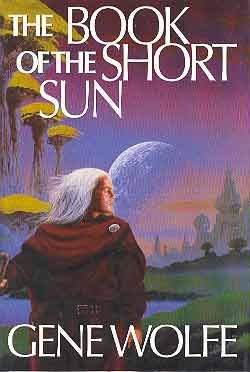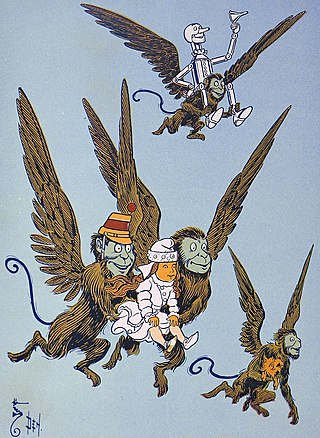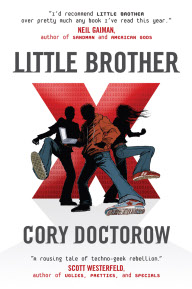Plot summary
The story mainly takes place in two Ontario locales. In flashbacks, the main character, usually but not always called Alan (he appears to have been alphabetized rather than named, and will answer to and identify himself as any masculine name beginning with A), and his brothers (also alphabetized) grow up outside of the remote town of Kapuskasing. The novel opens with Alan's purchase of a home in the Kensington Market neighborhood of modern-day Toronto.
There are two main plotlines. Alan befriends Kurt, a thirty-something punk who operates a dumpster-diving operation. Kurt uses computer components that he retrieves from the trash and turns them into Wi-Fi network access points. Kurt's goal is to blanket the entire neighborhood with free and secure Internet access by attaching his access points to buildings in a wireless mesh network with the permission of their owners. Kurt's plan doesn't really get off the ground until he forms a partnership with Alan, who puts a more professional face on the operation and sweet-talks many local owners into allowing the access points to use their space and a small amount of their electricity.
The second plotline features fantasy elements. Unbeknownst to most of the other characters, Alan and his brothers are not quite human. Their father is a mountain and their mother is a washing machine. Alan's eldest brother can see the future, his second-eldest is an island, his younger brother is undead, and his three youngest brothers are a set of Russian nesting dolls. Alan is the most normal-seeming of his family. Outwardly, he looks human, but he heals at an incredible rate, and if part of him is cut off, it will grow back, and the cut off part can be made to form a new copy of him.
Another plot strand concerns Alan's neighbors, a household of students and artists which includes Mimi, a troubled young woman who like Alan is not quite human. Born with wings on her back and no family history, she lives with her abusive boyfriend Krishna, a musician/bartender who can spot beings like Alan and his family, and hates them. Krishna amputates Mimi's wings every three months; she stays with him because she believes he's the only one willing and able to make her "normal."
Characters
Alan, the main character, is called by several names that start with "A", such as Adam and Abby. His brothers' names follow the same pattern, from "B" through "G" for the seventh and youngest brother. No name is given for their parents other than "mother" and "father". Alan is largely known as "Alan" in the narrator's voice, though rarely in any character's voice. Only in a few places does the narrator call Alan by another name.
Alan's neighbors' first names also follow an alphabetic sequence: Krishna, Link, Mimi, and Natalie. Mimi is merely a name that she is called, described as being "as good as any other". There are repeat uses of some of these letters, namely Kurt, Lyman, and Marci. (An O and a P name are also briefly mentioned).
There are also six anarchists collectively known as Waldo.
Almost everyone is known by their first name only. A good number of people are nameless, described by some physical characteristic instead.

Double Star is a science fiction novel by American writer Robert A. Heinlein, first serialized in Astounding Science Fiction and published in hardcover the same year. It received the 1956 Hugo Award for Best Novel.
A first-person narrative is a mode of storytelling in which a storyteller recounts events from that storyteller's own personal point of view, using first-person grammar such as "I", "me", "my", and "myself". It must be narrated by a first-person character, such as a protagonist, re-teller, witness, or peripheral character. Alternatively, in a visual storytelling medium, the first-person perspective is a graphical perspective rendered through a character's visual field, so the camera is "seeing" out of a character's eyes.

Cat's Cradle is a satirical postmodern novel, with science fiction elements, by American writer Kurt Vonnegut. Vonnegut's fourth novel, it was first published on March 18, 1963, exploring and satirizing issues of science, technology, the purpose of religion, and the arms race, often through the use of morbid humor.

Slaughterhouse-Five, or, The Children's Crusade: A Duty-Dance with Death is a 1969 semi-autobiographic science fiction-infused anti-war novel by Kurt Vonnegut. It follows the life experiences of Billy Pilgrim, from his early years, to his time as an American soldier and chaplain's assistant during World War II, to the post-war years. Throughout the novel, Billy frequently travels back and forth through time. The protagonist deals with a temporal crisis as a result of his post-war psychological trauma. The text centers on Billy's capture by the German Army and his survival of the Allied firebombing of Dresden as a prisoner of war, an experience that Vonnegut endured as an American serviceman. The work has been called an example of "unmatched moral clarity" and "one of the most enduring anti-war novels of all time".

Robert Benedict Browder is an American actor, writer and film director, known for his roles as John Crichton in Farscape and Cameron Mitchell in Stargate SG-1.

Cory Efram Doctorow is a Canadian-British blogger, journalist, and science fiction author who served as co-editor of the blog Boing Boing. He is an activist in favour of liberalising copyright laws and a proponent of the Creative Commons organization, using some of its licences for his books. Some common themes of his work include digital rights management, file sharing, and post-scarcity economics.

Breakfast of Champions, or Goodbye Blue Monday is a 1973 novel by the American author Kurt Vonnegut. His seventh novel, it is set predominantly in the fictional town of Midland City, Ohio, and focuses on two characters: Dwayne Hoover, a Midland resident, Pontiac dealer and affluent figure in the city, and Kilgore Trout, a widely published but mostly unknown science fiction author. Breakfast of Champions deals with themes of free will, suicide, and race relations, among others. The novel is full of drawings by the author, substituting descriptive language with depictions requiring no translation.

Down and Out in the Magic Kingdom is a 2003 science fiction book, the first novel by Canadian author and digital-rights activist Cory Doctorow. Concurrent with its publication by Tor Books, Doctorow released the entire text of the novel under a Creative Commons noncommercial license on his website, allowing the whole text of the book to be freely read and distributed without needing any further permission from him or his publisher.

The Brothers Karamazov, also translated as The Karamazov Brothers, is the last novel by Russian author Fyodor Dostoevsky. Dostoevsky spent nearly two years writing The Brothers Karamazov, which was published as a serial in The Russian Messenger from January 1879 to November 1880. Dostoevsky died less than four months after its publication. It has been acclaimed as one of the supreme achievements in world literature.

Odyssey 5 is a Canadian science fiction television series, which was shown in 2002 on Space in Canada and on Showtime in the United States. The premise involves five space travelers who witness the destruction of the Earth; they are given the opportunity to travel to the past to identify and prevent the cataclysm.

The Book of the Short Sun (1999–2001) is a series of three science fantasy novels or one three-volume novel by the American author Gene Wolfe. It continues The Book of the Long Sun (1993–1996): they share a narrator and Short Sun recounts a search for Silk, the Long Sun hero. The two works are set in the same universe as The Book of the New Sun series that Wolfe inaugurated in 1980 and the Internet Speculative Fiction Database (ISFDB) catalogs all three as sub-series of the "Solar Cycle", along with some other writings.

Winged monkeys are fictional characters that first appeared in the 1900 children's novel The Wonderful Wizard of Oz, written by the American author L. Frank Baum. They are described as jungle monkeys with bird-like feathered wings. They are playful, intelligent, and speak English. They are initially under the control of the Wicked Witch of the West, but are later controlled by the protagonist, Dorothy Gale. They lift Dorothy and fly her to two distant locations.

The Immortal is an American television series, starring Christopher George as a man whose blood chemistry and resistance to almost all diseases makes him both almost immortal and a target of several wealthy men who would basically use him as a personal blood bank, aired on ABC from September 24, 1970, to January 14, 1971. The series is based on a pilot film of the same name, which aired on September 30, 1969, as an ABC Movie of the Week. The pilot is based on the 1964 science fiction novel The Immortals, by James Gunn.
Madeleine L'Engle, an American novelist, diarist and poet, produced over twenty novels, beginning with The Small Rain (1945), and continuing into the 1990s with A Live Coal in the Sea (1996). Many of her fictional characters appeared in more than one novel, sometimes in more than one series of novels. Other major characters are the protagonists of a single title. This article provides information about L'Engle's most notable characters.

Little Brother is a novel by Cory Doctorow, published by Tor Books. It was released on April 29, 2008. The novel is about four teenagers in San Francisco who, in the aftermath of a terrorist attack on the San Francisco–Oakland Bay Bridge and BART system, defend themselves against the Department of Homeland Security's attacks on the Bill of Rights. The novel is available for free on the author's website under a Creative Commons license, keeping it accessible and remixable to all.
The idea of a fourth dimension has been a factor in the evolution of modern art, but use of concepts relating to higher dimensions has been little discussed by academics in the literary world. From the late 19th century onwards, many writers began to make use of possibilities opened up by the exploration of such concepts as hypercube geometry. While many writers took the fourth dimension to be one of time, others preferred to think of it in spatial terms, and some associated the new mathematics with wider changes in modern culture.

The Being Human novels are a series of three fantasy novels written by Simon Guerrier, Mark Michalowski and James Goss. The novels are based on the British television series Being Human, created by Toby Whithouse.

Luna: New Moon is a 2015 science fiction novel by British author Ian McDonald. It is the first of a three-part series that also includes Luna: Wolf Moon and Luna: Moon Rising. The novel explores the dangerous intrigue that surrounds the powerful Corta dynasty, one of the five families who control industry on the Moon. Optioned for development as a television series before it was released, the novel has been called "Game of Thrones in space".

The Overstory is a novel by Richard Powers published in 2018 by W. W. Norton & Company. It is Powers' twelfth novel. The book is about nine Americans whose unique life experiences with trees bring them together to address the destruction of forests. Powers was inspired to write the work while teaching at Stanford University, after he encountered giant redwood trees for the first time.
"Babylon's Ashes" is the sixth episode of the sixth and final season of the American science fiction television series The Expanse. It originally premiered on Amazon Prime in the United States on January 14, 2022, written by Daniel Abraham, Ty Franck, and Naren Shankar, and directed by Breck Eisner. The episode title draws its name from the sixth The Expanse novel of the same name written by James S. A. Corey, the joint pen name of Abraham and Franck.
















